

Mississippi College. Mississippi College. Pros and Cons of Leadership Theories. Leadership theories in management, have evolved over time into various types, with their own lines of thought.
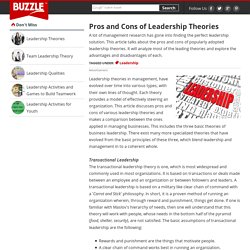
Each theory provides a model of effectively steering an organization. This article discusses pros and cons of various leadership theories and makes a comparison between the ones applied in managing businesses. This includes the three basic theories of business leadership. There exist many more specialized theories that have evolved from the basic principles of these three, which blend leadership and management in to a coherent whole. Transactional Leadership The transactional leadership theory is one, which is most widespread and commonly used in most organizations. Rewards and punishment are the things that motivate people.A clear chain of command works best in running an organization.Once employees agree to do a job, they are entirely in the hands of a manager. Cons: A powerful and assertive leader will find the transactional model conducive to his way of running things.
Leadership Styles. 1 Introduction.
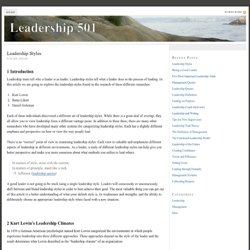
Leadership Theories - Eight Major Leadership Theories. What exactly makes a great leader?

Do certain personality traits make people better-suited to leadership roles, or do characteristics of the situation make it more likely that certain people will take charge? When we look at the leaders around us – be it our employer or the President – we might find ourselves wondering exactly why these individuals excel in such positions. People have long been interested in leadership throughout human history, but it has only been relatively recently that a number of formal leadership theories have emerged. Interest in leadership increased during the early part of the twentieth century. Early leadership theories focused on what qualities distinguished between leaders and followers, while subsequent theories looked at other variables such as situational factors and skill levels.
Laissez-Faire Leadership - What Is Laissez-Faire Leadership. Autocratic Leadership: Characteristics, Benefits and Downsides. Question: What Is Autocratic Leadership?

Answer: Autocratic leadership, also known as authoritarian leadership, is a leadership style characterized by individual control over all decisions and little input from group members. Autocratic leaders typically make choices based on their own ideas and judgments and rarely accept advice from followers. Transformational Leadership - Psychology - About.com. Have you ever been in a group where someone took control of the situation by conveying a clear vision of the group's goals, a marked passion for the work, and an ability to make the rest of the group feel recharged and energized?

This person just might be what is called a transformational leader. Transformational leadership is a type of leadership style that can inspire positive changes in those who follow. Transformational leaders are generally energetic, enthusiastic, and passionate. Not only are these leaders concerned and involved in the process; they are also focused on helping every member of the group succeed as well. Democratic Leadership - What Is Democratic Leadership.
Question: What Is Democratic Leadership?
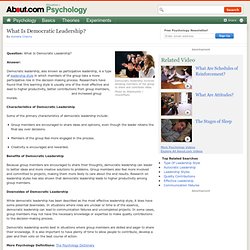
Answer: Democratic leadership, also known as participative leadership, is a type of leadership style in which members of the group take a more participative role in the decision-making process. Researchers have found that this learning style is usually one of the most effective and lead to higher productivity, better contributions from group members, and increased group morale. Democratic Leadership - What Is Democratic Leadership. Question: What Is Democratic Leadership?
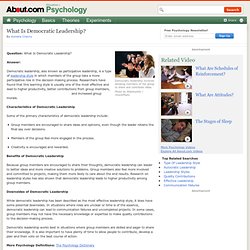
Answer: Democratic leadership, also known as participative leadership, is a type of leadership style in which members of the group take a more participative role in the decision-making process. Researchers have found that this learning style is usually one of the most effective and lead to higher productivity, better contributions from group members, and increased group morale. Great Man Theories - Great Man Theories of Leadership.
Have you ever heard the phrase, "Great leaders are born, not made"?
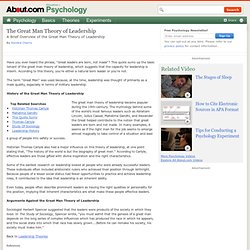
This quote sums up the basic tenant of the great man theory of leadership, which suggests that the capacity for leadership is inborn. According to this theory, you're either a natural born leader or you're not. The term "Great Man" was used because, at the time, leadership was thought of primarily as a male quality, especially in terms of military leadership. Social Identity Theory of Leadership. Why Leadership. Leadership Theories - Important Theories of Leadership. 甚麼是Situational Leadership? Define Leadership. Somewhere along the line in your career, you will try to define leadership.

Why is this so? As we work with bosses, managers and heads of units you will begin to wonder about their role. In fact, you will aspire to be a manager someday or positions higher than the one you are now. This article is meant to give you a quick overview of the various theories on leadership and how they define leadership from various aspects. With an understanding of leadership, you can start your quest to become a leader or a better leader.
So, how do you define leadership? This inevitably brings you to the next logical question – is then everyone that sits higher on a position in a hierarchy a leader? Although leaders are part of a hierarchy, not everyone on a hierarchy is a leader. Experts have been trying to define leadership via several aspects for many years. 1. So, this theory defines what are the qualities that a leader should posses rather than leadership. 2. 3. 4. Support Us. Inspirational Leaders Jeff Bezos - Research Papers - Bigcp13. Running head: Inspirational Leaders Who Have changed Some Organizational Cultures: Jeff Bezos Inspirational Leaders Who Have Changed Some Organizational Cultures: Jeff BezosColin PhelanNorthern Illinois University COMS 461Professor Scudder24 March 2012 Jeff Bezos is unarguably one of today’s most inspirational leaders.

He was born in Albuquerque, New Mexico, in 1964 and attended school in Miami Palmetto. After graduating from Princeton University, with a bachelor’s degree in electrical engineering, he worked in several jobs (Inc. 2009). Organizational CultureOrganizational culture can be related to how an organization organizes itself based on its rules and beliefs; therefore, culture gives an organization an identity. Transactional Leadership Vs. Transformational Leadership. I 251 Votes Number of Leadership theories evolved on the basis of Trait, Behavioral, Transformational, Situational, Charisma. Researchers and thinkers made efforts linking some of the theories across these leadership islands. But each model has its own pros, cons, assumptions & limitations. Latest researches are conducted on Situational & Transformational leadership styles.
Understanding the difference between transactional and transformational leadership is vital in getting the whole concept of transformational leadership theory. As a starting point, let us review our everyday life. In life, at one point of time, things happen without expectation from other side. Transactional Leader: approaches followers with an eye to exchanging one thing for another … Burns pursues a cost benefit, economic exchange to met subordinates current material and psychic needs in return for “contracted” services rendered by the subordinate ….